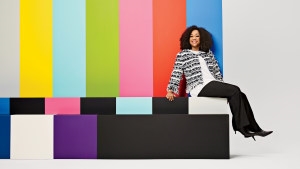Shonda Rhimes Sparks A Movement
One Monday afternoon, Shonda Rhimes sent me an email. The powerhouse behind ABC’s Grey’s Anatomy, Scandal, and How To Get Away With Murder launched right in with a story. A few days earlier, at the network’s presentation to advertisers in New York, executives announced that Scandal’s upcoming seventh season would be its last. Rhimes wasn’t at the event. She had skipped the trip to New York, choosing instead to live-stream the proceedings “in our Shondaland theater with all of our writers, editors, and the rest of the team.” Being in L.A. made her “glad,” she says, recalling her emotions in a single word. “Why was I glad? Because I didn’t have to actually face it. The decision I made. The decision to end a thing I love.” But there was another reason Rhimes stayed behind, one that was encapsulated by the selfie she included in the email: a black-and-white photo of her in sweats—no makeup, no blowout—staring intently into her MacBook. Rhimes has been busy lately, daydreaming up new projects and businesses fueled by a spirit of unyielding curiosity and experimentalism that she calls, simply, “What If We . . .”
This Shonda-ism, one of many phrases that she’s been injecting into the culture since dubbing Patrick Dempsey “McDreamy” on Grey’s almost 13 years ago, represents the exact kind of wit and inspiration she’ll undoubtedly call upon as she expands her empire this year. Shondaland, as Rhimes’s television production company is known, is another “ism,” which has grown to encompass the range of issues her shows explore—the kinds of gender politics and personal dramas encountered by her unapologetically ambitious, multicultural female characters. Shondaland.com, launching this fall, will further this mission as a hub for personal-empowerment content that reflects Rhimes’s inclusive worldview. The email in which she confessed her feelings about the ABC event was in fact her site’s inaugural newsletter.
“I just want to find other ways to tell stories, other ways to be engaged with the world,” says Rhimes, 47, when we meet a week or so later. Few television creators have ever achieved such name recognition, and those that have—Norman Lear (All in the Family), David E. Kelley (Ally McBeal), Chuck Lorre (The Big Bang Theory), and Ryan Murphy (American Horror Story)—have not only been white and male, but have mainly leveraged their clout to make yet more filmed entertainment (and more money).
Rhimes, on the other hand, aims to grow her personal brand through a variety of outlets, including advertising (producing a series of videos for Dove’s “Real Beauty” campaign) and advocacy (helping Planned Parenthood shape its message as it fights a Republican-controlled government intent on defunding it). Through Shondaland.com, she will release podcasts, emails, videos, playlists, essays, interviews, and diaries to reflect the entirety of women’s lives—with the goal of building community and encouraging action.
Rhimes could have merely exploited her fame by churning out, say, “sheets that say Mer-Der Forever,” she says, referring to Grey’s original lovebirds Meredith Grey and Derek Shepherd. (Though there is a line of Shondaland candles.) Rather, she wants to affect the culture, and women’s lives, in a way that she doesn’t think has been done since Oprah Winfrey’s peak. “You could be a woman in Alabama who’s a conservative Christian, or you could be a total crunchy-granola woman in Seattle and 20 years old, and both of you would watch Oprah,” she says. “Oprah would say, ‘Read this book,’ and everybody would, and they’d be talking about it. I don’t know if it’s possible to revive a role-model culture, but I like the idea of having a place to have conversations.”

Unlike Oprah, of course, Rhimes doesn’t have the recognition that comes from being the face of afternoon television for 25 years. She also has more competition. The idea that people could think of themselves as a brand is now 20 years old, and thanks to social media, everyone can be an influencer. Most brands today, from corporate ones like Nike to personal ones like Sheryl Sandberg, are trying to forge a more direct relationship with their customers and communicate with them in an unfiltered way. What Rhimes brings is a clear message that she has been broadcasting for more than a decade through her shows, reaching tens of millions of people, and, more recently, through digital platforms like Twitter, where she has 1.5 million followers. Most of all, Rhimes is a master storyteller—and has a personal tale to draw from, having overcome her fears to change her life. Strong, inclusive, ultimately uplifting communities of women shouldn’t only have to exist in a fictional Shondaland.
“I don’t think of myself as a television producer.”
Rhimes, dressed in all black with leopard-print heels, sits in a dimly lit room in a production space in West Hollywood. “Obviously, that’s crazy,” she says, after a pause. “Because I should. That’s what I do. But I don’t actually see that as my job. It’s why my business cards say ‘storyteller.’ Everyone’s like, ‘Shonda, please don’t call yourself that.’ But I’m like, ‘I don’t know how to say it any other way.’?”
Rhimes speaks the way she writes: efficiently and deliberately. There is no chitchat, no time for distractions. (When one of her dangly gold earrings diverts her attention, she quickly removes it.) Between statements, her otherwise amiable face relaxes into a serious, slightly intimidating nonexpression—a kind of sleep mode, perhaps, as if she is taking the time to recharge.
Sharing her innermost thoughts with strangers isn’t something that comes naturally. At Thanksgiving dinner in her hometown of Chicago, in 2013, Rhimes, the youngest of six, was in the kitchen with her eldest sister, Delorse, chattering on about the recent invitations she’d received to appear at events, parties, and talk shows. Rhimes, standing with her 3-month-old daughter strapped to her chest, told her sister that she had no plans to attend any of them. Not because she was too busy, but because she was uncomfortable in those settings, an introvert who, she joked, would have ended up as “a very quiet librarian” if she hadn’t pursued a creative life. She had always hated talking to the press, or anyone, in public, and considered the biannual gathering of TV critics—where show creators are expected to promote their programs—to be “a prime torture method.” Delorse, who was chopping vegetables, looked up at Rhimes and said, “You never say yes to anything.”
Those six words sent Rhimes into a period of deep self-reflection.
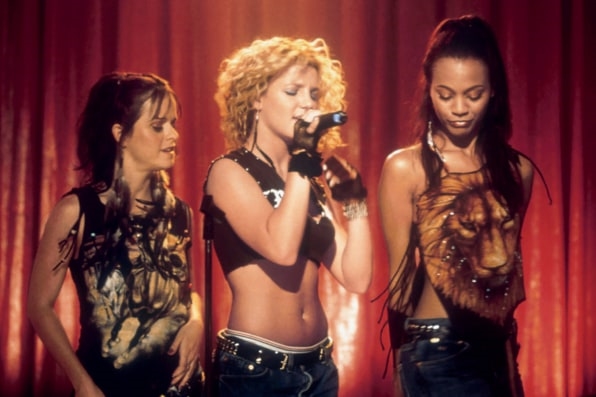
As a kid, Rhimes was happiest making up stories while sitting on the floor of the kitchen pantry. At the same time, her parents, both academics, drilled into her the need to be assertive. “In my house, you got in trouble if you didn’t speak up,” she says. “My mom would be furious at us if we went to school and behaved nicely if someone treated us badly. If we got in trouble because we had yelled at them or told them that they were wrong, my mother would be like, ‘Good job.’”
Rhimes has always been deft at combining these opposing inclinations within her TV characters: strivers and perfectionists whose potentially crippling flaws and insecurities are masked by an impenetrable-seeming surface. The one she says she most identifies with is Cristina Yang, Grey’s overachieving, Stanford-educated surgeon played by Sandra Oh. Yang is most at peace in the OR, where she can immerse herself in the complexities of surgery and not have to deal with the less easily solvable messiness of personal relationships. (Oh left the show after 10 seasons, in 2014.) Now Rhimes wanted to reconcile the two impulses within herself.
When she emerged from her introspective funk a few months later, she overcorrected. She vowed to say yes to everything for a year—and to write a book about the experience. It wasn’t just about the fancy parties. The self-described workaholic wanted to be more open to downtime and to her three kids—whom she refers to on Twitter as her “tiny humans”—and who are constantly asking for more of their single mother’s time, usually as she’s heading out the door to go to work.
Rhimes embraced the literary life as well. “It was a lovely journey. It was me getting up at 5 o’clock every morning to write before the kids got up. It’s as close to being Toni Morrison”—her childhood ambition—”as I’ll ever come in my life, and it was just a beautiful, singular experience.” Even the inevitable bad parts. “I spilled water on my computer in Martha’s Vineyard and almost lost my entire book,” she recalls, laughing. “I was like, ‘I’m an author. I almost lost my book, but—I feel like I’m real.’?”
Rhimes’s evolution into a yes-aholic made for a great read. Year of Yes: How to Dance It Out, Stand in the Sun, and Be Your Own Person was a New York Times best seller for nine weeks after being published in November 2015, and it positioned Rhimes as a voice of comfort and encouragement to millions of people, well beyond those who were familiar with her shows. But as she details in her memoir, the path was tortuous. She finally agreed to appear on Jimmy Kimmel’s late-night show, after rebuffing his requests for years, but insisted that the segment be taped on the Scandal set. Kimmel, sensing her discomfort, graciously arranged it so that she never had to “walk and talk at the same time,” as Rhimes says, and Betsy Beers, Rhimes’s longtime producing partner, sat strategically in Rhimes’s line of vision the entire time. “She didn’t ask me to,” says Beers. “She wouldn’t. But I knew I should.”
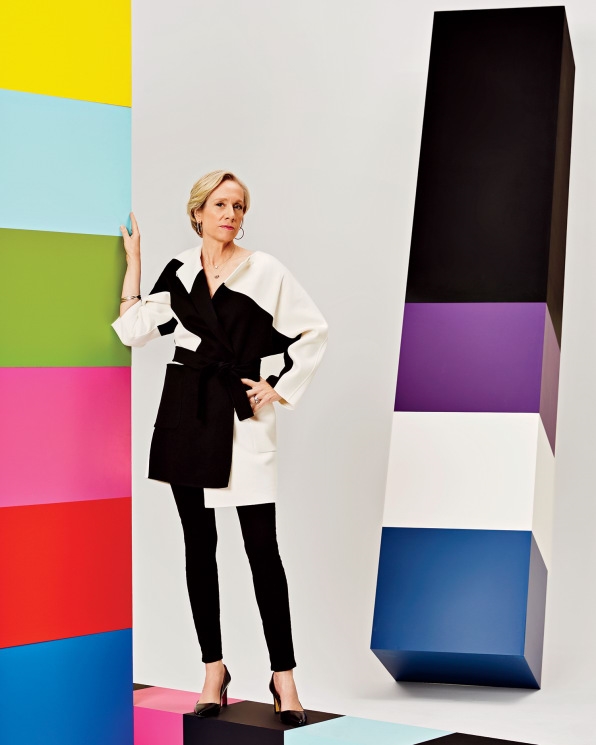
Rhimes survived the experience and others, including a Kennedy Center Honors reception (President Obama named her to the board) and delivering a funny, moving speech at a Women in Entertainment breakfast (“I was born with an awesome vagina and really gorgeous brown skin. I didn’t do anything to make either of those things happen. To get all Beyoncé about it, people: ‘I woke up like this’?”). She discovered a new groove in her work and personal life, shedding almost 150 pounds after “saying yes to my body”(instead of ice cream), and found satisfaction in facing crowds after agreeing to deliver the commencement address at Dartmouth College, her beloved alma mater. She learned to carve out space in her schedule for play and downtime, refusing to answer emails after 7 p.m. or on weekends (and insisting that her employees do this too). She’s since appeared several times on Jimmy Kimmel Live, and she even did a TED Talk based on her book.
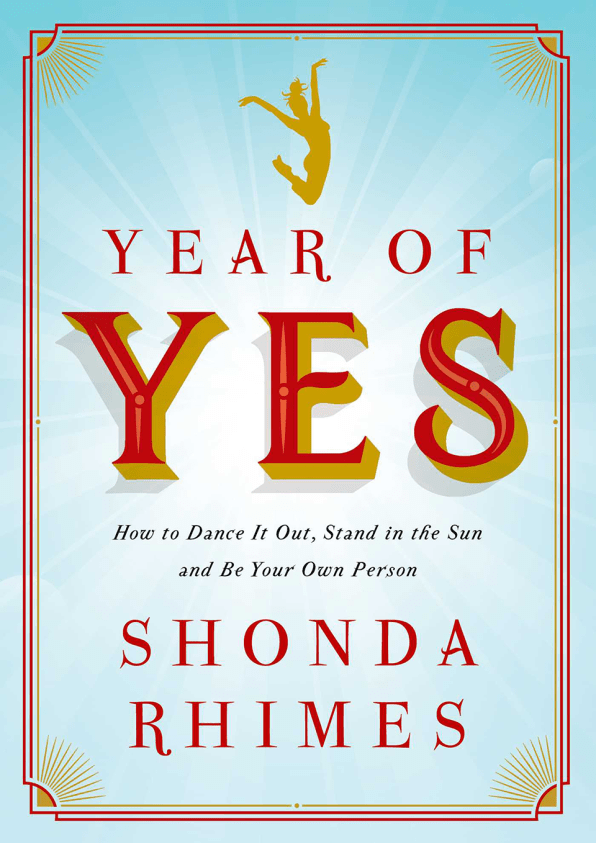
Rhimes’s “Year of Yes” officially ended in early 2015. But during her book tour the following fall, she realized that she wasn’t ready for her journey to be over. Thousands of fans were showing up at bookstores and at women’s conventions to hear her read. “It wasn’t, ‘Oh, this is exciting for me.’ It was more like, we’re influencing people in a way that I had not really taken in,” she recalls. “There’s a whole group of women who became doctors because they watch Grey’s Anatomy. There’s a whole group of people who think of diversity very differently because they watch the shows.” Young fans just discovering Grey’s on Netflix were stopping Rhimes in public. “I feel like the Pied Piper, because there are 12-year-olds who are like, ‘Shonda!’?” That power, she says, made her realize that she and her Shondaland team “had an opportunity that we were wasting if we didn’t try to talk to them in other ways.”
“It was the first time she saw that it was about more than just a TV show,” says Chris DiIorio, Shondaland’s VP of strategy and business development. “She’d put a product out there that was not an hour-long drama.”
Not long after, Hillary Clinton’s campaign reached out to Rhimes about making a biographical documentary that would screen at the Democratic National Convention immediately before Clinton accepted the nomination to be the first female major-party presidential candidate in U.S. history. Rhimes said yes, of course, and calls the experience as invigorating as stepping onto the Grey’s set for the first time. She also appeared in an ad for Clinton along with Grey’s star Ellen Pompeo, Scandal’s Kerry Washington, and How to Get Away With Murder’s Viola Davis. Expressing her political beliefs without the cover of fiction moved her to think about new ways to communicate them. “She understands that people are drawn to her for her TV shows,” says Washington, “but also for her own personal courage and her own voice.”
Donald Trump’s presidency has made Rhimes even more outspoken. When we meet at the end of May, the networks have just announced their new shows for the 2017–2018 season (Rhimes herself has sold two to ABC), and when I ask her about it, she breaks her poise for the first time. “I’ve heard a lot of post-election talk that suggests that people think that we have left out a section of the country that is white and male,” she says. “And the shows that have gotten picked up [by the networks] reflect that. To me, that feels like the most ridiculous scam that has ever been pulled on the networks. Ever. The idea that you believe that white men don’t have a voice is astounding to me. That’s what you got out of the election?”
Rhimes is a pragmatist. She owes her first big success to being willing to cater to market forces. But only to a point. After a decade writing movies that mostly didn’t get made, she decided to try TV. After her first pitch to ABC about female war correspondents was nixed because of the war in Afghanistan, she asked network executives: “What does Bob want?” referring to Bob Iger, who at the time was president and COO of Disney, ABC’s parent company. When the answer came back that he was interested in a show set in a hospital, she wrote the pilot for Grey’s, which pleased the Disney brass but tested their limits. During development, the pilot was nicknamed “Sex and the Surgery,” its racy subject matter a daring leap for the family-friendly channel.
Back then, Rhimes was “very quiet,” says Linda Lowy, who cast that show and every Shondaland one since. During meetings with executives, Lowy recalls, Rhimes “would tell us what she thought after a meeting instead of speaking up in the room. We’d get off a conference call, and she’d say, ‘I don’t really want that.’ Or, ‘I think that’s better.’ I called her a couple times at home to say, ‘Honey. Shonda. It’s you that has to say no.’?”
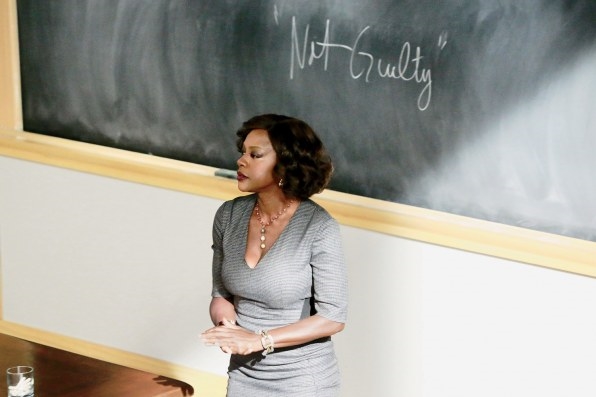
But she was never afraid to create strong, diverse characters who challenged television norms. “We wanted to see people like us,” says Beers, meaning individuals from all different backgrounds who defied stereotypes and were better at their jobs than their personal lives. Also: women who went through miscarriages and abortions and didn’t think it was taboo to talk about them. And race. “We’re not going to explain, these two people are married and this is the color of their child,” Lowy says. “Maybe the kid was adopted, maybe not, I don’t know.” The success of this approach has paved the way for a number of hit network series led by nonwhite characters, including Empire, Fresh Off the Boat, Black-ish, and Rhimes’s own Scandal, which in 2012 became the first show with an African-American female lead since Get Christie Love! went off the air in 1975. “She ushered in the era that we’re in,” says former NBCUniversal executive Lauren Zalaznick. “Highly aspirational, highly integrated, highly fluid.”
Scandal crystallized what the critic James Poniewozik calls “Rhimesian” TV: shows that disregard the measured pacing of traditional programs and conclude each episode with the kinds of dramatic cliff-hangers once reserved for nail-biting season finales. In Shondaland, lead characters are killed off with a shrug, and zany new plotlines are introduced like specials at the local diner.
Rhimes has been particularly inventive in helping to build a loyal audience for her shows. She “very smartly understood how the internet was blooming and used it as an opportunity for that kind of direct feedback,” says Channing Dungey, president of ABC Entertainment. Rhimes was early to embrace blogging: She and other Grey’s writers would riff on episodes and created separate blogs for several of the characters. Rhimes was instrumental in creating podcasts featuring interviews with actors and writers from her shows. The Grey’s one ran for 35 episodes, and a broader Shondaland podcast has been running since 2012. “We kept trying to explore different ways of giving people access to a different side of the story,” says Beers, who is Shondaland’s resident podcast host. Rhimes, Washington, and the rest of the Scandal cast were among the first TV creators to live-tweet episodes and craft hashtags around events in each episode, making it the rare scripted series that needed to be watched live to be fully appreciated.
These innovations have made Rhimes’s shows wildly popular—and extremely profitable for ABC. In 2014, the network turned over its entire Thursday night block of programming to Rhimes. Shondaland shows generate hundreds of millions in ad revenue and licensing fees, which ABC and Shondaland split. “They’ve helped us define our brand,” Dungey says.
With four series currently on the air, two more in development, and a large team of veteran producers and writers to manage them, Shondaland’s TV operation has evolved into a large, smooth-running machine and created the space for Rhimes to consider new opportunities like Shondaland.com. “I realized I was doing this job that I love,” she says, “but that I can now do it very easily. Every new story is a challenge. But the producing part—like, I wasn’t learning new things about producing.”
Last March, she pushed herself into new territory by forging a partnership with Dove. Working with brands is an important part of her own brand extension, and Rhimes signed up to be the creative director of a video series that invites women to submit short films about unconventional beauty. Dove and Rhimes shared a history—stars from Grey’s and Private Practice were featured in the company’s ad campaigns a decade earlier—but this was different. This would be personal. Rhimes was blunt about her weight struggles in Year of Yes. “No one’s body is up for comment,” she wrote. “No matter how small, how curvy, how round, how flat. If you love you, then I love you.
“But this is not about loving me. I didn’t feel good.”
During the writing of her book, Rhimes started Pilates and learned to control her emotion-triggered food impulses. (When Beers, who’s preternaturally wisp-thin, suggested that Rhimes train herself to like salads, Rhimes says she didn’t talk to her for three days.) The pounds came off. But Rhimes soon realized that she had a larger responsibility. “Whenever anybody says, ‘Oh, you look great!’ I’m like, Yeah, because that woman over there got me into four pairs of Spanx and dressed me. I love that I look this way, but I’m not going to look this way in 20 minutes, when I go home, take those Spanx off, and wash my face, which I’m going to do immediately. I’m beautiful whether I’m wearing all this crap or not, and I want my 14-year-old daughter to think that [way about herself] too.”
This message resonated with Dove’s VP of marketing Nick Soukas, who was impressed with Rhimes’s skill at “portraying women as they really are and broadening the definition of what women can do.”
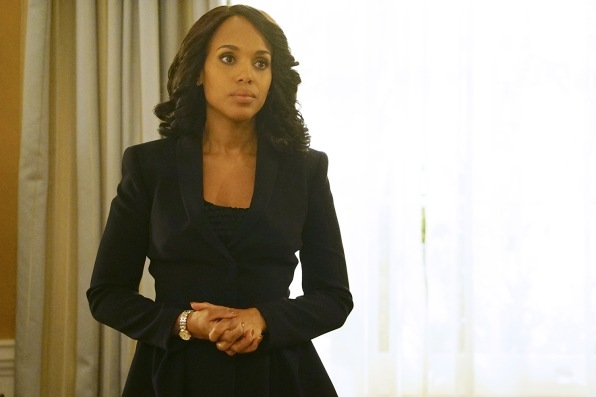
It’s also what encouraged Planned Parenthood president Cecile Richards to offer Rhimes a seat on the organization’s national board. Characters on Grey’s, Private Practice, and Scandal have “frank conversations” about issues that previously on TV “no one ever talked about very much,” Richards says. Private Practice, in particular, tackled the topic of abortion, and a woman’s choice, several times. “We can learn a lot from Shonda at this moment in which women in America need a voice.” (Rhimes’s speech at Planned Parenthood’s May gala went viral, thanks to such pointed barbs as “In 2017, women’s health needs protecting. Like some kind of endangered species. Like, holy crap, vaginas might go extinct.”)
Rhimes hopes to feature Richards’s voice, in turn, on Shondaland.com. She tells me that she’s already conducted her first interview for the site, with congresswoman and resistance hero Maxine Waters. “We talked for, like, hours,” Rhimes says. “It was amazing.” I ask how political Shondaland.com might become, and Rhimes doesn’t flinch. “The election happens and you realize that there’s a bigger problem out there,” she says. “We’ve all been very comfortable. There are some things that need to be said out loud, and maybe I don’t have to be the one to say them. But I’d like this to be a place for them to be said.” Shondaland.com has already lined up such activist contributors as Luvvie Ajayi, Aminatou Sow, Sally Kohn, and Mallory Ortberg to make some of those statements. There will be lighter fare as well: playlists from Rhimes’s music producer, Alex Pastavas; fashion pieces by Scandal stylists; essays by Shondaland writers; and Rhimes’s Dove spots, plus any other partnership content that might develop.
Earlier this year, Rhimes hired Jennifer Romolini to oversee the site and find the right high-low mix. Romolini, who is tall and radiates a quirky, smart-girl vibe, is a Yahoo veteran who most recently ran HelloGiggles, a content hub for twentysomething women cofounded by actress-musician Zooey Deschanel. (Time Inc. bought it for a reported $30 million in 2015.) Romolini says Shondaland.com will be aimed at an older demo that’s currently underserved online. “There’s a lot of emphasis and focus digitally on millennials,” she says. “There’s not that much for women in their thirties, forties, fifties. Grown-ass women, let’s say. I’m thinking about the issues that you deal with in adulthood—taking care of your business, money, buying a house, all of that. While also getting deep into relationship stuff.”
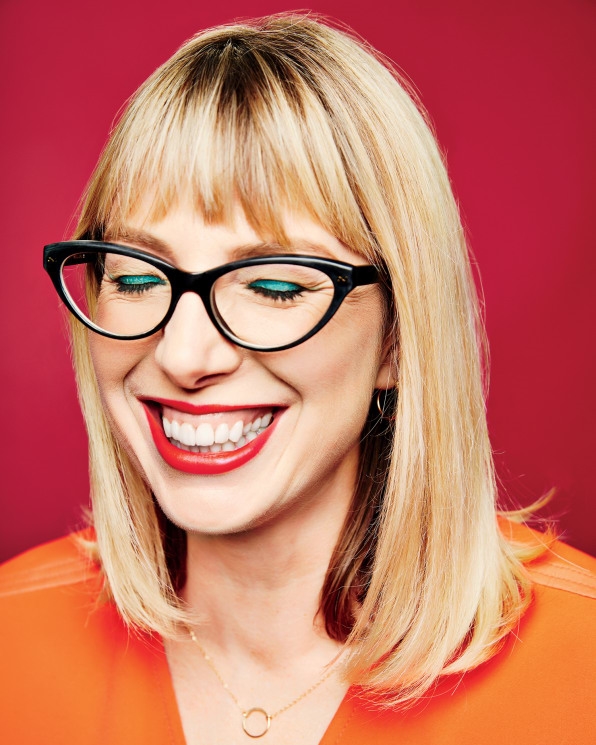
Shondaland.com will offer Rhimes something TV production can’t: immediacy. But she’s nowhere near done with television yet. It’s been five years since she first wrote “Interior, day, Oval Office” for Scandal, and her fans are hungry for a fresh story from her. (With the exception of How to Get Away With Murder, shows created by her protégés have not fared as well as Rhimes originals. The con-man drama The Catch was canceled after two seasons, and as of June, ratings for Still Star-Crossed, a riff on the Romeo and Juliet tale, were flat.) “I’m now in a place where I have the power to protect and shield other writers, grow them, and give them what they need to have their own shows,” Rhimes says. “I love that. But, I mean, creating my own shows is, it’s so much fun.”
When our interview is over, Rhimes heads to a photo shoot in a nearby studio. Beyoncé is blasting on the speakers as Rhimes takes her place in front of the photographers. In between the firing of the camera flash, she does funny mouth-relaxing exercises and dances it out, to use a Rhimesian phrase, before settling back into a power pose. Beers is standing on the sidelines watching, smiling ever so slightly. Rhimes never looks over even once.
The introverted creator of TV’s Grey’s Anatomy and Scandal is developing her own digital-centric personal brand. Will she be the next Oprah?
Fast Company , Read Full Story
(59)

